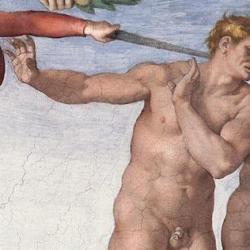Jean-Louis Chretien begins his Hand to Hand with a series of meditations on the story of Jacob wrestling with God, and artistic representations of that episode.
He quotes Francois de Sales, who wrote: “Our Lord may turn us and sweep us round to the left or to the right; he may, as if with other Jacobs, clasp us tightly, and wrench us in a hundred ways; he may press us first to one side, then to the other; in short, he may do us a thousand hurts; nevertheless we will not leave him until he has given us his eternal blessing. And let me add, my daughter, that our good God only abandons us in order better to secure us; never does he leave us except to watch over us all the more; never does he wrestle with us except in order to give himself to us and to bless us.”
God gives himself only to those who lower their defenses. In Delacroix’s painting of the scene, Chretien calls attention to the pile of discarded clothing and weapons in the foreground: “Delacroix is alone in introducing, with keen precision, this superabundant disarmament. To give up all defenses and weapons to enter into the fight, to confront the irresistible assailant counting on nothing more than one’s own presentation, to come at him openly: such are the conditions of combats that are in truth life-and-death matters, combats in which something of ours must die, and a new life enter to dwell within us. Only the disarmed can grow in strength. To take arms, to surround oneself with defenses, is already to place oneself in a position of weakness, and at the same time to refuse the salutary intimacy of close combat. What must die in us will only truly die by not allowing itself to die, by burning up every last bit of its power, without any reserve. This is what it means to die a natural death.”











